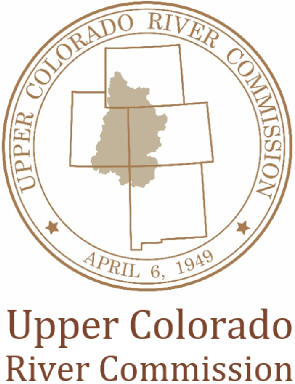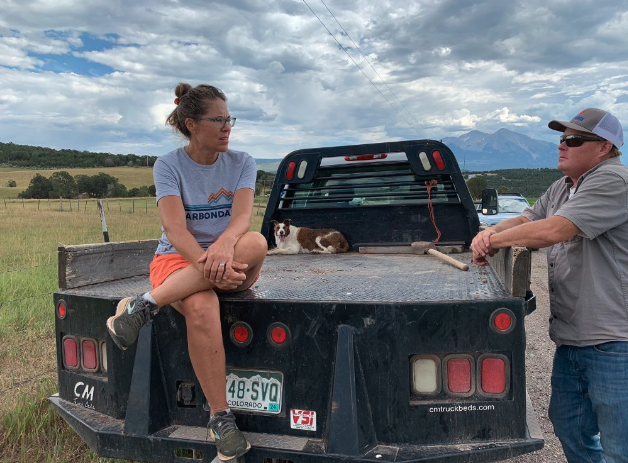By Heather Sackett for Aspen Journalism
Changes to pricing, timing contemplated for potential 2024 reboot
Cassie Cerise lives on her family’s ranch on Missouri Heights, a mesa above Carbondale named for the home state of some of the area’s earliest settlers.
Like her parents and grandparents, she runs cattle and irrigates hay and alfalfa fields — some by sprinklers, others by flood — with water from Cattle Creek. But this season, she and her husband, Tim Fenton, decided to let about 73 acres go dry and get paid for the water they aren’t using as part of the federally-funded System Conservation Program, which is aimed at addressing the crisis on the Colorado River. According to her contract with the Upper Colorado River Commission, which oversees the program, not watering her fields this season will save about 83 acre-feet of water.
“We struggled with whether or not to do this, but in hindsight, it was ‘We’ll give you money to not work as hard, and you get to go to your kid’s baseball games this summer,’” she said. “So we said, ‘Sign us up.’”
For Cerise, who sits on the board of the Mount Sopris Conservation District, the motivation to participate in system conservation was mostly financial. After being embroiled in a lawsuit with a neighbor, her family needed the money. But she said the payments will also go toward a new sprinkler system on the fields currently being fallowed, which will help ensure the future viability of the ranch.
“If we are going to keep ranching this place and our kids are going to have an opportunity to ranch, we needed to get some money back into our coffers,” she said. “It just seemed like a win for us if we could use it to better the ranch in the long term, and the sprinklers might be easier as we age to keep the ranch in production.”
Themes Emerging
The System Conservation Program is paying water users in the four upper basin states — Colorado, New Mexico, Wyoming, and Utah — to cut back. Although water users from all sectors can participate, all of the projects in Colorado involved agricultural water users on the Western Slope. Participation, which is voluntary, is funded with $125 million from the Inflation Reduction Act.
System conservation was first tried in the upper basin from 2015 to 2018 and saved an estimated 47,000 acre-feet of water, at a cost of about $8.6 million. Last year, the UCRC announced it would restart a system conservation program as part of its 5-Point Plan, aimed at protecting critical elevations in Lake Powell and Lake Mead, which have fallen to record-low levels in recent years because of overuse, drought, and climate change.
On Tuesday, UCRC staff presented to commissioners lessons learned from the first year of the rebooted program and asked for guidance about whether it should be implemented again in 2024. After talking with participants, UCRC Executive Director Chuck Cullom said five themes emerged, the first of which was criticism of the tight timeline for the program’s rollout. Program details were released in December 2022, with an original application deadline of Feb. 1, 2023, which was extended to March 1.
“Trying to engage in the end of December to early spring is too tight a time frame; people are planning for their next crop now,” he said. “Early October is an optimal time.”
He said participants also wanted firm, fixed pricing for their water. This year, the UCRC set the opening price at $150 an acre-foot and applicants had to negotiate and convince officials that their water was worth a higher price, a process that some irrigators told Aspen Journalism was insulting.
Participants also wanted more clarity on how the amount of water conserved was estimated; clear and consistent messaging; and greater transparency about the goals of the program.
Three of the four upper basin state commissioners said they were leaning toward doing system conservation again in 2024. Colorado Commissioner Becky Mitchell was noncommittal.
“I want to be incredibly thoughtful on the approach that we take,” she said. “I’m going to need a bit of time to digest it but also engage with Colorado’s water users before making a decision.”
The UCRC will have another meeting before early October to make a decision on whether to go forward with the program in 2024.

